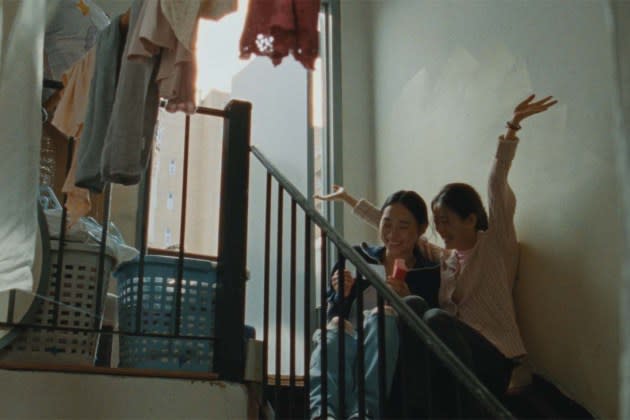‘Blue Sun Palace’ Review: An Intimate, Affecting and Dogma-Free Portrait of Chinese Immigrants in Working-Class New York

It’s become something of a movie fashion to forestall the title credits until well after an establishing sequence, if not deeper into the film. But when the title appears onscreen in Blue Sun Palace, at the half-hour point, there’s nothing self-consciously stylish about it: It marks a dramatic, ground-shifting change in perspective, a gut-punch of a narrative fracture, and one that writer-director Constance Tsang executes with assurance.
At the helm of her first feature, Tsang has made a sharp and tender story about dislocation, centering on a trio of hardworking Chinese immigrants in New York. In the movie’s first 30 minutes, Tsang draws us into the intimate orbit of her expatriate characters: a construction company employee and two colleagues at a massage parlor. Then, the sudden absence of one of them sets everything askew. Absence is the current that drives the narrative: absence from family, from homeland, from purpose. The world these characters inhabit, within an enclave of Flushing, Queens, is a place of in-between, captured in the evocative half-light of Norm Li’s cinematography, suggesting the cool-hot glow of the title’s blue sun. The poignant chords of Sami Jano’s elegantly lean score further fuel the angsty mood.
More from The Hollywood Reporter
'Eephus' Review: An Existential Baseball Comedy That's Less About the Game Than a Dying Pastime
Cannes Legend Jia Zhangke on His "Very Emotional" New Film 'Caught by the Tides'
The Blue Sun Palace is a restaurant outside the movie’s main New York setting, making its appearance late in the proceedings. It’s in another, unnamed restaurant that the film kicks off, without ceremony, in a remarkable sequence. The eatery itself is barely seen, Li’s camera moving between Hunan native Didi (Xu Haipeng) and Cheung (Lee Kang Sheng), from Taiwan, holding them close as they dig into spicy chicken and fall into each other’s gaze.
It will be a while before we know their names, or who they are to each other. There’s a sense of established emotional intimacy between them, but at the same time they’re still getting to know each other. Eventually, the likely deduction is that he’s been a client of hers at the massage parlor she runs. When he speaks of his loneliness, his words are muted and restrained, and her eyes well with compassion, the play of feeling on Xu’s face breathtaking. This is not your standard first date. But it is a turning point, the infatuation deepening during an entranced karaoke duet. Didi and Cheung’s morning-after pillow talk is a beautifully played depiction of awakening and connection, mischievous and light even as it delves into the weightier territory of hopes and dreams, a conversational turn sparked by a calendar photo on Didi’s wall.
For Didi, some of those dreams involve Amy (Wu Ke-Xi), her closest friend at the massage parlor and the third key character. Amy is a gifted cook, and she and Didi talk of opening a restaurant together. In the meantime, they, along with Josie (Murielle Hsieh) and Fei (Zheng Lisha), spend their days and nights massaging the bodies of their male customers. A sign on the front door warns, “No Sexual Services,” but exceptions are made — sometimes grudgingly. And, as one tense scene demonstrates, not every client is respectful, to put it mildly.
As to the business’ unseen proprietor — it’s unlikely that the four women have ownership stakes — the movie offers no information or hints. There are a couple of other instances where Tsang could have made the narrative details less hazy, although these lingering questions don’t unmoor the story or lessen its impact.
What is clear is the bond among the parlor’s four women, the sisterly humor that gets them through the workaday hours and helps them withstand the overall sense of displacement. In ways both obvious and offhand, they nurture one another. The feast Amy prepares for Lunar New Year evokes fond and tearful memories of home for Josie. In the here and now, Didi’s maternal warmth is the glue holding everything together. But things break apart, and, as one character notes, “It’s funny how quickly the people you love become strangers.”
Picking up the story after a specific cataclysm and an unspecified length of time, Tsang turns her focus to the question of how to go on, and whether devotedness can devolve into clinging to what’s gone. Amy, obsessed with repairing a ceiling leak, worries it like a wound. Cheung, who has only one friend at work (Leo Chen), fields mirthless calls from his wife and daughter in Taiwan that are always about money, nothing else. When he takes Amy to the restaurant from the opening scene, you might call it a dramatic version of an Annie Hall joke, the bit where Alvy’s attempt to duplicate the romantic hilarity of a lobster dinner with Annie falls numbingly flat with another woman. Cheung’s disappointment aside, for Amy the fraught dinner gives way to the simplest and most difficult realization of all: “I just need to change something.”
While Xu’s compelling vibrancy suffuses Blue Sun Palace, her co-stars offer thornier portrayals. Playing in an unpredictable register, Wu (Nina Wu) gives pulsing life to Amy’s wary brittleness and its eventual melting. Lee, the longtime muse of Taiwanese director Tsai Ming-liang, carries Cheung’s yearning and joy, his guilt and sorrow, in a performance that’s all the more gripping for being measured and contained.
As to the resolution of these characters’ story, it remains an open question in the subtly moving final scenes. In massage parlor reception areas and backrooms, working-class restaurants and karaoke bars, Tsang and her strong cast, with superb contributions from production designer Evaline Wu Huang, have captured something evanescent and life-giving, and grounded it in kitchen clatter and workplace chatter, the gritty day-to-day.
Best of The Hollywood Reporter

 Yahoo News
Yahoo News 